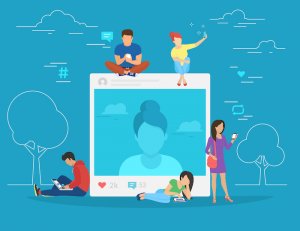9 Sobriety Social Media Influencers
Social media is an undeniably powerful force of our modern culture. From geopolitical governance to trending makeup tutorials, social media has been proven able to shape, shift, and shake our collective consciousness. When it comes to recovery-oriented or sober lifestyles, social media has increasingly become a beacon for many–both for “sober curious” individuals and those in recovery. Similar to trends in wellness and fashion, legions of sobriety “influencers” now connect with their followers through hashtags like #SoberisSexy and #SoberLife. 
While experts continue to debate the efficacy and safety of social media’s role in addiction and recovery, these ten sobriety influencers are gaining thousands of followers and quickly altering the traditional ideas of peer support, sober lifestyles, treatment regimens, and recovery communities.
Jessica Landon @jessicalandon12
Writer, actor, speaker, and certified resilience recovery coach, Jessica Landon has been in recovery since 2014. Since then, her mission has been to help others struggling with addiction. In addition to exploring her childhood trauma and addiction via her TEDx Talk “Laughing at Addiction—the Science of Using Humor to Heal,” she also has written a soon-to-be released memoir, “Human on Fire.” You can join her 97,000 Instagram followers, explore her story and resilience program on her website, and check out her 2023 appearance on “Addiction Talk.”
Irene Rollins @irenerollins
Passionate about physical, emotional, mental, and spiritual health, Irene Rollins has both co-lead a mega-church and struggled with alcohol addiction. Through her teaching, writing, and coaching, she enables people to be the best versions of themselves. Along with her appearance on “Addiction Talk,” she boasts a large Instagram following and recently authored “Reframe Your Shame: Experience Freedom from What Holds You Back.”
Sober Black Girls Club @soberblackgirlsclub
More a pack of influencers than a single individual, the Sober Black Girls Club is a 501(c)(3) organization that provides love, support, and resources to black females practicing sobriety, whether they’re in recovery or considering it. The website offers a list of meetings, info on member meetups, and even info on a medical fund for treatment-related costs. Join them on Instagram, view their “Addiction Talk” episode, or check out their podcast, which tackles all things related to recovery, community, and growth.
Laura Cathcart Robbins @lauracathcartrobbins
Laura Cathcart Robbins has an active Instagram following and is the host of the podcast “The Only One In The Room.” Additionally, she details her struggle with addiction and journey to recovery in her 2023 book “Stash: My Life in Hiding.” Active for many years as a speaker and credited for creating The Buckley School’s nationally recognized committee on diversity, equity, inclusion, and justice, she also appeared on a 2023 “Addiction Talk” episode titled “Turning the Page on Addiction.”
Marci Hopkins @wake_up_with_marci
With more than six years of sobriety, Marci Hopkins is an award-winning TV host and author as well as the executive producer of “Wake Up with Marci,” which airs on WLNY/CBS New York. Her show tackles a wide range of issues including mental health, domestic violence, divorce, addiction, trauma, social impact, health, wellness, and more. Having experienced sexual abuse and addiction, she appeared on a 2023 episode of “Addiction Talk,” where she continued her mission to inspire and empower her audience, and in 2023, she authored “Chaos to Clarity: Seeing the Signs and Breaking the Cycle.”
Holly Whitaker @holly
Author of “Quit Like a Woman: The Radical Choice to Not Drink in a Culture Obsessed with Alcohol” and founder of Tempest, a subscription-based recovery support network, Holly Whitaker has more than 150,000 Instagram followers. In recovery since 2012, Whitaker personally considered AA as a “non-starter” and treatment as financially unfeasible when seeking recovery. Today, her abstinence-based recovery network, Tempest, provides three tiers of membership, which offer subscribers access to a private 24/7 online community, virtual support groups, as well as live lectures, workshops, and Q&A’s.
Laura McKowen @Laura_McKowen
Another blogger turned author, Laura McKowen penned the memoir “We Are the Luckiest: The Surprising Magic of Sober Life,” which was published in January 2020. Her social media presence has garnered McKowen more than 86,000 followers on Instagram. She’s also the founder of The Luckiest Club, an online subscription-based recovery community and offers gender-specific recovery courses for women. In addition, McKowen co-hosts the HOME Podcast with Holly Whitaker to discuss various issues related to addiction recovery.
Annie Grace @thisnakedmind
An author with nearly 132,000 Instagram followers, Annie Grace is a sobriety influencer who helped define the notion of “sober curious.” During her recovery she authored “This Naked Mind,” which offers insight to Grace’s own psychological and social struggles with alcohol. However, she also created The Alcohol Experiment, a 30-day alcohol-free challenge. According to her website, The Alcohol Experiment is intended to assist individuals who wish to control their alcohol consumption without necessarily abstaining from it.
Austin Cooper @soberevolution
Austin Cooper is an evidentiary case of how popular “the style of sobriety” has become in recent years. After 3 years in recovery, Cooper began sharing inspirational quotes and funny memes regarding sobriety on his Instagram page in 2016. After a short time, his Sober Evolution page has grown to 69,000 followers looking to take sobriety one day at a time just like he does.
Sobriety Social Media Influencers and Recovery
Without question, a cultural celebration of sobriety and the destigmatizing of addiction are good things. However, many behavioral health experts cite the danger of social media’s ability to conflate the ideas of sobriety and recovery. In other words, they’re concerned about addressing the symptom (substance abuse) without addressing any underlying causes through clinical treatment, therapy, and other traditional hallmarks of recovery.
Social media will continue to influence millions online, especially when it comes to lifestyle, and it’s hard to argue that living in recovery isn’t a type of lifestyle. However, considering the seriousness of addiction, let’s hope that substance and style can coexist in the social media ecosystem. Let’s hope that recovery isn’t merely trending.


